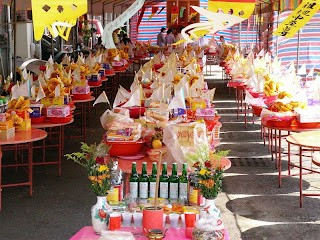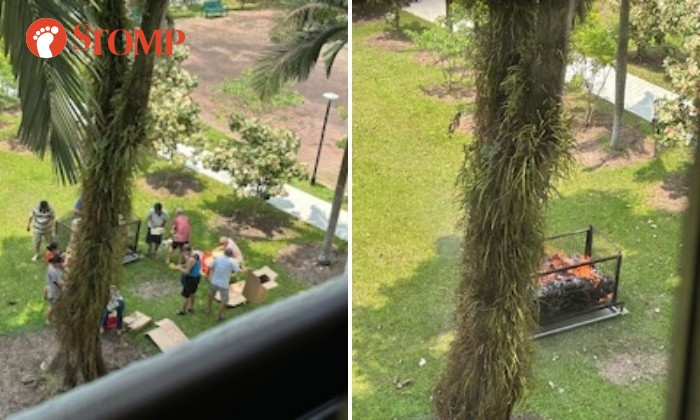

Ang Mo Kio residents illegally set up cage to burn offerings on last day of Hungry Ghost month
It has happened before. Ang Mo Kio residents illegally set up a burning cage on the grass in a common area where it was not permitted to burn offerings. Stomper Elise shared photos of the incident, which happened on Sept 2, the last day of Hungry Ghost month.
"These groups of uncles repeatedly set up burning cages and I understand that this is not allowed under the law," said the Stomper. "As you can see from these photos, there are huge boxes and one whole mountain of incense papers being burned. This is not a funeral and there are no funeral held at the void deck. When we called up the town council, they said this was not approved by them.
She added that it was a recurring problem. "This is a serious safety issue as I've seen it several times. When the wind blows onto the cage, there are swirling burning incense papers flying all over the place." The Stomper said the burning cage was still sitting on the grass patch on Sept 4.
related:
Chinese Ghost Festival
The Ghost Festival (also known as Zhongyuan Festival by Taoists or Yu Lan Pen Festival by Buddhists) is the day to pay respects to the deceased by offering sacrifices. In Chinese culture, it is thought that all ghosts will come out from the hell on the fifteenth day of the seventh lunar month, so the day is called the Ghost Day and the seventh lunar month is the Ghost Month.
In China, people think on the Ghost month, the gate of hell will open to allow the ghosts and spirits go back to the living world. During the month, those have families will visit their families and those alone will roam on the street to seek food and entertainment. Family members usually offer sacrifice to their deceased ancestors and relatives during the month and on the Ghost day. They are honored with delicious food three times a day on a table. The family’s ancestral tablets and photographs will be put on the table with incense burning near them. People also pay tribute to those unknown wandering ghosts with food and burn joss paper to please the ghosts on the 15th (some places on the 14th) day of the 7th lunar month to avoid the harm by them.
Buddhists and Taoists usually perform ceremonies on the day to help the ghosts ease the sufferings. They will set altars for them and chant scriptures. Monks often throw rice or some small foods into the air to distribute them to the ghosts. On the evening of the Ghost day, people also make lanterns and float them on the river to help their relatives find their way back to home. The lanterns are usually lotus flower-shaped with light or candles. Some people also write their ancestors’ name on the lanterns.
Hungry Ghost Festival
Hungry Ghost Festival takes place on fifteenth day of the seventh month in the Lunar Calendar
Just as the Americans have Halloween, the Chinese have the Hungry Ghost Festival (also known as Zhong Yuan Jie in Chinese), when the souls of the dead are believed to roam the earth. According to custom, these ghosts can get up to mischief if ignored so all sorts of offerings are made during this period, which is the seventh month in the lunar calendar.
Making offerings:
read more
Making offerings:
- Notice those metal bins scattered around residential areas and housing estates?
- They are specifically provided to contain the stacks of hell money and paper offerings, such as cars, watches and jewellery, that are burned by relatives to appease their deceased family members – taking care of their material needs even in the afterlife.
- Do watch your step in case you trample on food left out in the open. Although many place their food offerings (oranges, rice or even suckling pig) and joss sticks on proper altars, others tuck them at the side of footpaths or even alongside trees.
- And as if satisfying the ghosts’ appetites for money and food wasn’t enough, taking care of their entertainment is also important.
- Large tents are set up in open fields to host raucous dinners and auctions in heartland estates like Ang Mo Kio and Yishun. There are performances too, such as Chinese operas and 'getai' (literally ‘song stage’ in Chinese, or live stage performances), which feature tales of gods and goddesses, bawdy stand-up comedy, as well as song and dance numbers.
- Everyone is welcome – so sit back and enjoy the show. Just remember not to sit in the front row, unless you want to rub shoulders with the ‘special guests’.
- A mainstay of the festival is the 'getai' performance, thrown as a popular mode of entertainment for the wandering spirits. But 'getai' today is a very different animal – jazzed up with snazzy LED panel lit stages. Young, sexy perfomers sing not just traditional songs in dialect but thumping techno versions of English and Mandarin pop ditties. It appears that even the tastes of the spiritual world are moving with the times.
read more
Zhong Yuan Jie
Zhong Yuan Jie (中元节) takes place on the fifteenth day of the seventh month of the Lunar calendar. It is mostly observed by Chinese Buddhists and Taoists who believe that during this time, colloquially known as “seventh month” or 七月 (“seventh month” in Chinese), the gates of Hell are opened, releasing spirits who roam the earth.
The period is also commonly referred to as “Hungry Ghost Festival”, with reference to the belief that spirits are hungry because they do not have descendants to make offerings to them. However, it is not just mischievous spirits who roam the earth during the seventh month – it is also believed that dead ancestors may come back to observe the living. Hence, there are various practices associated with entertaining and appeasing these spirits. For instance, believers will burn joss sticks, paper offerings and make food offerings. There will also be large-scale performances called getai (歌台)which provide entertainment to both the spirits and the living.
Zhong Yuan Jie is practised in Asian countries and communities with a large Chinese, Buddhist or Taoist population, including in China, Hong Kong, Taiwan, Thailand, Malaysia, and Singapore. In Singapore, individuals may conduct their own rituals of worship in their own homes, at temples, or in the neighbourhood. Believers living in different parts of Singapore may gather to engage in collective burning of offerings using big stainless steel containers provided by the Town Council. Getai shows are typically performed outdoors in temporary tent and stage setups, such as at empty fields in in the public housing estates. In Singapore, the festival is mostly observed by Chinese Buddhists and Taoists. Certain temples conduct specific rituals such as prayers and burning of offerings. Temples may also have believers sponsor a separate batch of food items, which are distributed to the needy.
Taboos to Avoid during Hungry Ghost Month
As the ghosts and the suffering spirits will come out from the hell to visit their homes during the 7th lunar month (the ghost month), many things should be avoided during this month including the ghost day:
- Don't stroll at night.
- Don't swimming. It is said that the drowned evil ghost might try to drown you in order to find victims for them to rebirth.
- As the month is considered to be inauspicious, don't move to new houses, start new businesses or marry.
- Don't hang clothes outside at night.
- Do not pick up coins or money found on the street and never bring it home.
- Do not step on or kick the offerings by the roadside. If you step by accident, you should apologize aloud to make it alright.
- Do not wear red because ghosts are attracted to red.
- Don't sing and whistle as these may attract ghosts.
- Keep away from the walls as it is believed that ghosts like sticking to walls.
- If you are born during the ghost month, avoid celebrating your birthday at night. It's better to celebrate during the daytime.
Zhong Yuan Jie 2013 盂蘭節 Hungry Ghost Festival
Hungry Ghost Festival is one of the major festivals in Chinese culture. It is a month-long festival celebrated on the 7th Lunar month and this year, it fell on 1st August. On that day, it is believed that the “Gates of Hell” are opened and the dead will return to the human world. During this period, many Chinese will try to AVOID moving in to a new house, getting married, staying out late etc.
The food on the table are offerings for the restless souls wandering around during the one-month long Hungry Ghost Festival. My friend told me his friend who is able to see “things” saw those spirits grabbing the food to eat during the 7th Lunar month.
Sounds scary? Well, to appease the wandering spirits to prevent them from entering homes and causing disturbances, food such as chicken, rice, vegetables are placed along the roadside and street corners to making offerings to the spirits. Bundles of hell bank notes are burnt as offerings to the spirits for them to spend in hell. These hell bank notes come in different denominations! They are hell lots of big notes!!
read more
Singapore Getai (歌台)
Getai (歌台), which literally means “song stage” in Chinese, is believed to have originated during the Japanese Occupation at the New World Amusement Park. It became a popular form of mass entertainment in the 1950s with getai established at various amusement parks. Today, getai is mainly staged during the Hungry Ghost Festival (中元节; zhong yuan jie) to entertain both the living and the dead.
Getai is said to have originated during the Japanese Occupation of Singapore (1942–1945). The first getai is believed to be the Da Ye Hui (大夜会) at the New World Amusement Park.4 At the time, Da Ye Hui had a five-member band and two singers, and they would perform every night, mostly singing. The other main getai then was An Na Shi Tang (安娜食堂), also established at the New World Amusement Park.6 The songs performed were generally folk songs or more traditional Chinese songs. Getai went on to become a popular form of entertainment. There were two reasons for this: the Japanese allowed the proliferation of getai because they loved music, and the locals flocked to getai for the much-needed entertainment to distract them from the hardship during the occupation.8 In those days, the audience did not have to purchase tickets to attend the shows; they were only required to pay for the drinks ordered.
The popularity of getai coincided with the decline of the ge wu tuan (歌舞团; song-and-dance troupes) that had taken root in Singapore in the 1920s.10 After the war, the getai remained a popular form of entertainment. According to Bai Yan, one of the veterans of ge wu tuan and getai, businesses flourished during the early 1950s – the economy was booming and people had money to spend as a result of the Korean War. With limited forms of entertainment, getai was then the entertainment for the masses. Today, getai is the most common form of entertainment during the Hungry Ghost Festival.27 Getai acts are usually performed on make-shift stages in open-air venues in Housing and development Board (HDB) estates. In 2007, it was reported that there were as many as 40 getai acts a night during the festival, with each attracting 1,000 to 5,000 people.28 Although getai performances are also staged throughout the year by various entities such as residents’ committees, community centres and corporations, getai is synonymous with the Hungry Ghost Festival and has become an identifying feature of the festival.




